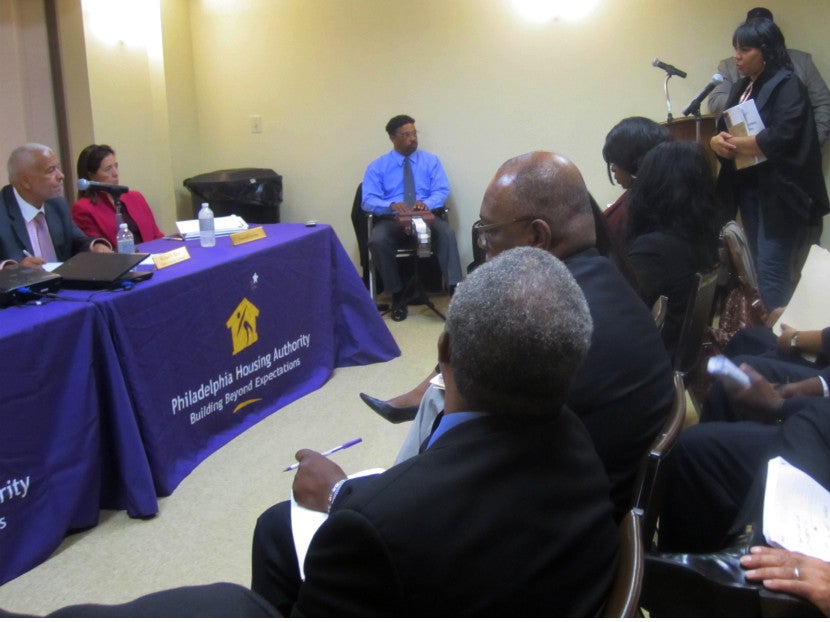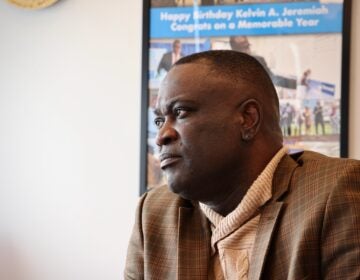North Philadelphia: Philadelphia Housing Authority auction upsets residents

This article was created in partnership with Philadelphia Neighborhoods, Temple University’s capstone multimedia journalism class.
Betsy Esteves was surprised to see the empty lot next to her home on North Third Street–a lot she fenced off, planted grass on, did some minor gardening in and has been struggling to purchase from the Philadelphia Housing Authority for years–among 400 properties listed for auction on Nov. 16. She was even more surprised to see that lot listed in a bundle of 10 properties that will be sold as one unit.
In October, PHA announced a plan to auction off 400 of the vacant homes and lots it owns throughout Philadelphia. PHA said it hopes this type of sale, a first for the organization, will return the properties to private owners who agree to make improvements within five years, generate capital that the authority will invest in its other properties and reduce blight throughout the city.
To sell off such a large number of properties, PHA hired Max Spann Real Estate & Auction Co., and the two organizations developed a bundling strategy in which some of the properties will be auctioned individually and the rest will be sold in asset packages of anywhere from two to 25 properties.
The lot that Esteves is interested in is being auctioned in a group of 10 properties, several of which are empty lots.
“I just want the one empty lot,” Esteves said. “What am I going to do with all these empty lots?”
Several Philadelphia residents said they were hoping the auction would provide an opportunity to purchase or build homes in their neighborhoods and are upset by the bundling strategy.
“When this came about, Darrell Clarke and City Council said, ‘Here is a chance for people to own a home,’” said Yvonne McGough, a resident who attended one of the informational meetings held by Max Spann. “Now when I come here it’s a whole different story. This is just for investors. [PHA] forgot about us. We’ve been pushed aside.”
PHA is the fourth-largest public housing authority in the country and cites its 14,000 affordable housing units as a gauge of its size. Perhaps an equally impressive indicator of scale is the number of scattered properties PHA owns throughout the city, approximately 8,000, said Executive Director Michael Kelly. Roughly half of the 8,000 scattered sites are vacant. To put that in perspective, the city of New York, where Kelly formerly served as New York City Housing Authority general manager, owns approximately 1,400 scattered site properties.
“We don’t have enough money to build new houses or in some cases manage some existing housing that may have crossed over to a level of deterioration,” Kelly said at a board of commissioner meeting on Oct. 27.
Because of this lack of funding and because the scattered site portfolio is a particularly difficult portfolio to manage, PHA approached the U.S. Department of Housing and Urban Development approximately three years ago and requested permission to dispose of 1,100 of the approximately 4,000 vacant scattered site properties that PHA owns.
After obtaining HUD’s permission, PHA approached the City of Philadelphia and local community development corporations. The city expressed interest in approximately 100 of the properties and community development corporations agreed to take roughly 450 to 500.
To dispose of some of the remaining properties, PHA organized the Nov. 16 auction and listed 400 vacant, scattered site properties available for purchase.
To make the sale of such a large number of properties feasible and to ensure that properties of low value as well as properties of higher value are purchased, PHA bundled a majority of the properties into asset packages of anywhere from two to 25 properties based on geographic location and real estate value.
“I live in [PHA] housing,” Yolanda Jefferson said at one information session. “I feel like I should have had an opportunity to buy before they put them out [to the public].”
Jefferson said PHA’s affordable housing is overcrowded and there are often waiting lists. She said this could have been an opportunity for PHA to help some of its residents invest in private housing and, in turn, accommodate individuals and families on affordable housing waiting lists.
Of the 400 properties originally listed for sale in the Nov. 16 auction, 14 were listed as individual properties. Before the auction, one was removed from the list because of legal complications.
The remaining 386 properties originally listed were broken into 26 asset packages of between two and five properties and 24 asset packages of between six and 25 properties.
“I’m flabbergasted by the fact that I only have 15 options when…I know 20 people are coming [with me],” Jefferson said.
Max Spann, president and CEO of Max Spann Real Estate & Auction Co., said he heard the objections of Jefferson and other disgruntled Philadelphia residents.
“You can’t please everyone,” he said. “The attempt was to please and be sensitive to the community while meeting the goals of PHA.”
Some of the individuals who attended the Oct. 26 information session were upset that no one from PHA was present to hear their concerns.
“They know they did something wrong,” Jefferson said. “Why else wouldn’t [PHA] have a representative here?”
At the Oct. 27 board of commissioner meeting, Kelly addressed residents and said, “It could very well have been that we should have taken into account other kinds of situations in the bundling.”
“We will continue to look at and seek your advice and counsel,” he said. “But at this point I think we have an auction that’s been advertised.”
Because a majority of the properties listed for auction are clustered in Philadelphia’s 5th District, Councilman Darrell Clarke received phone calls from constituents upset by the auction and bundling strategy.
Clarke attended the Oct. 13 event announcing the auction, but when asked how he is involved, he said “minimally, if at all.”
He said the reason the properties are clustered in the 5th District is that most of the housing authority’s scattered site properties are in North Philadelphia.
“Over a period of time as a council person, I’ve gotten complaints about vacant properties in the district, vacant lots or structures, and quite frequently we realized once we did the ownership check that these properties were owned by the Philadelphia Housing Authority,” Clarke said. “Pretty much all of them were in significant disrepair and actually in numerous instances people would say, ‘If I can get that house, I’d love to fix it up and live in it.’”
“We got some of those calls upon the [auction] announcement, and we talked to the housing authority in the intention to break some of [the bundles] up,” Clarke said. “But what they did to facilitate the opportunity relatively quickly, they are going to add an additional 100 properties to the auction and all of those will be single sell.”
These properties will be sold at a second auction on Dec. 7, but some residents are still upset. McGough, for instance, said she wants two specific properties that are still scheduled for auction on Nov. 16 as part of a five-property asset package.
“I want my neighborhood to go up, but I’m just saying [PHA is] putting this in the hands of investors,” she said. “That’s [going to] literally destroy the little people that have been living in Philadelphia, in their communities for years.”
Reverend Glenn Shepherd of the Campbell AME Church in Frankford attended one of the auction information sessions to get information to share with his congregation.
“I think if it goes well it’ll do something for the city of Philadelphia,” Shepherd said. “Most of the properties we see are abandoned, and it’s an eyesore. We have to get Philadelphia back to what it needs to be.”
Still, Shepherd is not sold on the bundling strategy.
“The only drawback is when they have the asset packages,” he said. “That really doesn’t allow the small investors or someone looking to purchase a home the opportunity.”
Judith Robinson, a licensed real estate broker and North Philadelphia resident, said she would like to see PHA unbundle the properties.
“These are average people,” Robinson said. “They come to bid. They want to buy, so it’s not like they’re going to waste people’s time… but they cannot buy bundles of six, 10, 20 properties.”
Despite the community’s mixed response, PHA and Max Spann Real Estate and Auction Co. remain optimistic.
“If you come back in a year or so, I would imagine that this neighborhood would be vibrant and wonderful,” said Michael Johns, general manager of community development and design at PHA. “The idea is that this concept can be replicated across the city to improve these neighborhoods and bring these neighborhoods back to a vibrant neighborhood again.”
“I can tell you that they’re not putting on this big party not to sell property,” said Robert Dann, executive vice president and chief operations officer of Max Spann. “So I think everyone’s going to get good yields.”
WHYY is your source for fact-based, in-depth journalism and information. As a nonprofit organization, we rely on financial support from readers like you. Please give today.




